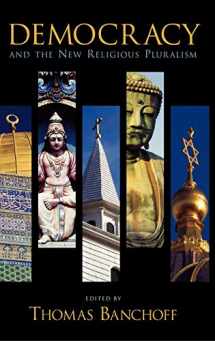
Democracy and the New Religious Pluralism
ISBN-13:
9780195307221
ISBN-10:
0195307224
Edition:
1
Author:
Thomas Banchoff
Publication date:
2007
Publisher:
Oxford University Press
Format:
Hardcover
352 pages
FREE US shipping
Book details
ISBN-13:
9780195307221
ISBN-10:
0195307224
Edition:
1
Author:
Thomas Banchoff
Publication date:
2007
Publisher:
Oxford University Press
Format:
Hardcover
352 pages
Summary
Democracy and the New Religious Pluralism (ISBN-13: 9780195307221 and ISBN-10: 0195307224), written by authors
Thomas Banchoff, was published by Oxford University Press in 2007.
With an overall rating of 3.9 stars, it's a notable title among other
books. You can easily purchase or rent Democracy and the New Religious Pluralism (Hardcover) from BooksRun,
along with many other new and used
books
and textbooks.
And, if you're looking to sell your copy, our current buyback offer is $0.3.
Description
Religious pluralism is everywhere in today's politics. Increased immigration flows, the collapse of communism, and the globalization of communications technologies have all fostered a wider variety of religious beliefs, practices, and organizations within and across democratic societies. This is true in both the United States and Europe, where growing and diverse minority communities are transforming the political landscape. As a result, controversies over such things as headscarves and depictions of Mohammed are unsettling a largely secular Europe, while a Christian majority in the US faces familiar questions about church-state relations amidst unprecedented religious diversity. Far from receding into the background, religious language pervades arguments around established issues such as abortion and capital punishment, and new ones such as stem cell research and same-sex marriage. In Democracy and the New Religious Pluralism, leading scholars from multiple disciplines explore these dynamics and their implications for democratic theory and practice. What are the contours of this new religious pluralism? What are its implications for the theory and practice of democracy? Does increasing religious pluralism erode the cultural and social foundations of democracy? To what extent do different religious communities embrace similar -- or at least compatible -- ethical and political commitments? By seeking answers to these questions and revealing religious pluralism as both a source of animosity and a potent force for peaceful engagement, this book offers a revealing look at the future of religion in democratic societies.


We would LOVE it if you could help us and other readers by reviewing the book
Book review

Congratulations! We have received your book review.
{user}
{createdAt}
by {truncated_author}


